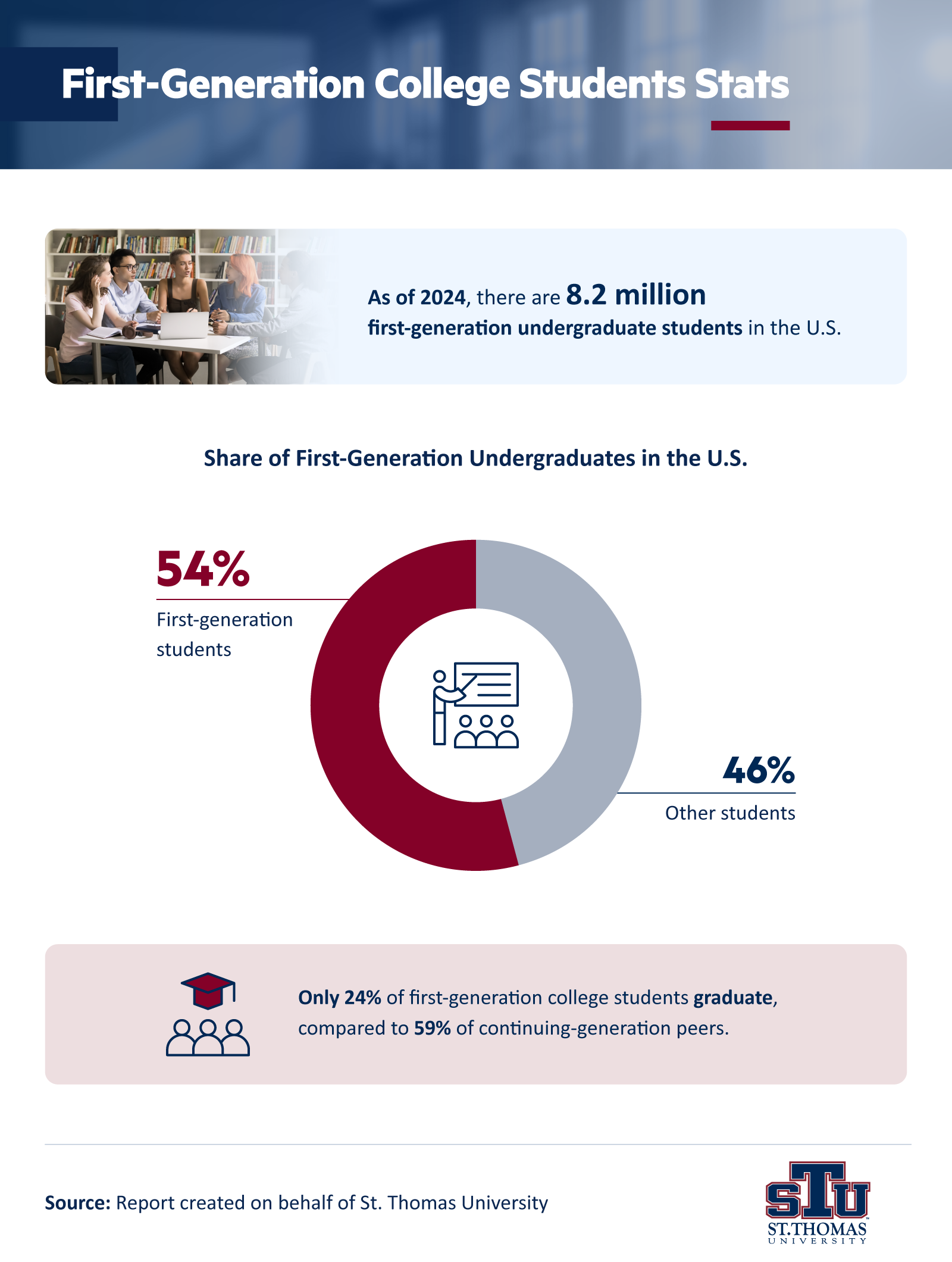
Pursuing a graduate degree is a major step. For first-generation college students, the path can look different from what it does for peers whose family members have already earned advanced credentials. These students often navigate higher education without the same inherited knowledge of application processes, financial aid or campus resources. Yet, they make up a significant share of undergraduate students and continue into grad school in growing numbers.
This report was conducted on behalf of St. Thomas University (STU) to give first-generation students clearer insight into the graduate school experience and the resources that can support them along the way. It outlines key trends in enrollment, funding and student success, while also offering strategies that can help prospective first-gen graduate students navigate challenges and take advantage of new opportunities in higher education.
Key Takeaways
- As of 2024, there are 8.2 million first-generation undergraduate students in the U.S.
- First-generation college students graduate at a rate of 24%, compared to 59% for continuing-generation peers.
- Adult learners, who include many first-generation students, are increasingly enrolling in graduate programs, including through online and other flexible formats.
First-generation Students in Higher Ed
First-generation students now make up a substantial portion of U.S. undergrads, shaping the future of graduate school enrollment and completion. As their numbers rise, so does the need for resources and programs that support persistence from a bachelor’s degree to graduate study.

According to FirstGen Forward, there were 8.2 million first-generation undergraduate students in the United States as of 2024. Nontraditional undergraduate enrollment (ages 21 and older) grew between 16.7% and 19.7% in fall 2024, with the largest increases among students ages 25 to 29. Adult learners preferred online or flexible program formats that supported career goals and family responsibilities. For first-generation graduate students, these pathways offer more access to advanced study in areas such as health sciences and other in-demand fields.
The NSC Research Center also recently reported that total postsecondary enrollment was up 3.2% in spring 2025 compared to the previous year. Total undergraduate enrollment grew 3.5% to 15.3 million students. Graduate school enrollment increased 1.5%, now making the rate 7.2% higher than in 2020. But even with this growth, degree completion remains a challenge.
While 54% of all undergrads in the U.S. are first-generation students, only 24% graduate with a bachelor’s degree compared to 59% of continuing-generation students. This gap highlights how starting graduate school is a significant achievement for many first-gen students who overcome barriers at the undergraduate level.
Among those who completed a bachelor’s degree, first-generation college graduates showed promising persistence. According to an RTI International report, 65% of first-generation graduates enrolled in a master’s program, compared to 56% of continuing-generation graduates. At the doctoral level, however, the trend reversed. Only 14% of first-generation graduates enrolled in doctoral programs compared to 24% of continuing-generation graduates.
Challenges and Opportunities for First-generation Graduate Students
First-generation graduate students face unique obstacles that can impact their educational success. Many of these challenges stem from navigating unfamiliar academic environments without family guidance or robust support systems. They may experience a limited sense of belonging, feelings of inadequacy or academic anxiety. Balancing coursework with full-time employment and family responsibilities can add further stress.
Despite these hurdles, new opportunities continue to emerge. Online education provides flexible schedules for adult learners to balance academics with work and family commitments. Programs that offer accessible faculty support and virtual peer communities can also help first-generation graduate students feel more connected and confident in their studies.
Conferences also play a key role in building networks and strengthening student success. Events such as the First-Generation Graduate and Professional Student Symposium and the NASPA First-Generation Student Success Conference offer valuable networking, mentorship and professional development tailored specifically for first-gen students.
Paying for Graduate School as a First-generation Student
For first-generation students, the process of securing aid can feel unfamiliar. Knowing the funding options available and who to turn to for help makes the process easier to navigate. Graduate financial aid includes federal loans, scholarships, fellowships and grants. Unlike undergraduate aid, most graduate students are not eligible for subsidized loans, which means interest accrues immediately. Adult learners, particularly those balancing work and family responsibilities, must carefully plan their borrowing and repayment strategies.
Completing the Free Application for Federal Student Aid (FAFSA) is the gateway to federal loans, work-study and some institutional funding. First-generation students often find FAFSA questions challenging, especially when accounting for dependents or nontraditional family structures. To address this, many universities provide FAFSA workshops and counseling. Additional resources, such as SoFi’s Graduate FAFSA Guide, offer tips on timelines, loan types and strategies for securing funding.
Scholarships and Fellowship Resources for First-Generation Grad Students
Scholarships and fellowships provide important financial support for first-generation students in graduate school. Many programs also include mentorship and career planning opportunities that strengthen long-term student success. Key resources include:
- Jack Kent Cooke Foundation: Scholarships, fellowships and mentorship for high-achieving first-gen students
- NSF Graduate Research Fellowship Program: Funding for research-based graduate study in NSF-supported fields
- Fastweb and Scholarships.com: Databases with filters for first-generation scholarships
Balancing Academics, Work and Life in Graduate School
First-generation graduate students often juggle multiple responsibilities beyond coursework. Time management strategies can help sustain academic success while maintaining personal well-being.
Understand and Prioritize Your Goals
Start by reflecting on what you want to achieve through your graduate studies both professionally and personally. Setting clear academic and life priorities allows you to allocate limited time effectively. A roadmap or timeline for major milestones, such as coursework, thesis writing or exams, helps maintain focus and motivation.
Set SMART Goals
Break down larger tasks into specific, measurable, achievable, relevant and time-bound (SMART) goals. For example, instead of vaguely planning to “study more,” aim to “dedicate 10 hours weekly to thesis research and writing.” SMART goals reduce procrastination and provide a way to track progress consistently.
Minimize Distractions
Identify common distractions and take steps to limit them during study sessions. This may include silencing phone notifications, using website blockers or working in a quiet, dedicated space. Consider trying the Pomodoro Method, which alternates 25 minutes of focused work with 5-minute breaks, to help sustain concentration.
Create and Stick to a Schedule
Designate specific time blocks for studying, work and family. Tools such as Google Calendar or Outlook make it easier to organize tasks visually. Blocking out focused study periods and avoiding multitasking improves efficiency. Scheduling breaks and downtime also prevents burnout.
Manage Stress and Support Mental Wellness
Graduate school can be stressful, and first-generation students may experience imposter syndrome or pressure from balancing multiple roles. Strategies such as mindfulness exercises, counseling services and peer support groups can strengthen resilience and promote well-being.
Utilize Institutional and Community Resources
Academic advisors, financial aid counselors and student success offices often provide targeted support for first-generation students. Online learners can also explore virtual mentoring programs and community groups to build a support network. FirstGen Forward offers resources and community connections for both undergraduates and graduate students.
Finding Support as a First-gen Graduate Student in an Online Program
A strong support network plays a vital role in academic and professional success. For first-generation graduate students, especially those studying online, connecting with mentors and campus resources provides guidance, motivation and a sense of belonging.
Engaging With Mentors
Mentorship helps first-gen students gain confidence and practical skills. For example, America Needs You offers a two-year Fellows Program that pairs first-generation college students with mentor coaches who provide career planning and skill-building support. Fellows participate in workshops, virtual events, and networking opportunities that build readiness for graduate school and careers.
Another program, the Graduate Student Mentorship Initiative (GSMI) connects first-generation and underrepresented STEM applicants with mentors in their field. Participants receive one-on-one guidance, feedback on applications, and access to webinars that prepare them for graduate study and academic careers.
Accessing Virtual Campus Resources
Many universities offer virtual advising, tutoring, counseling and career services designed for first-generation and adult learners. Staying engaged with these resources is key to building community and advancing student success. At STU, the Student Success Center provides online students with:
- Academic advising: Personalized sessions for course selection and goal setting
- Career guidance: Support in aligning academic interests with professional pathways
- Academic support: Tutoring and tools for overcoming academic challenges
- First-year experience: Programs that help with the transition into college life
- Graduation planning: Guidance for meeting requirements and completing a degree on time
STU online students can also use virtual student services, including library resources and technology help. Additional career resources include job postings, internships and volunteer opportunities through Handshake.
Moving Forward as a First-generation Graduate Student
For many first-generation college students, the decision to pursue graduate school is both an academic milestone and a personal achievement. Whether you are continuing directly after earning a bachelor’s degree or returning as an adult learner, the path forward presents unique challenges but also meaningful opportunities.
By seeking out financial aid resources, connecting with mentors and engaging with virtual support systems, first-generation graduate students can strengthen their persistence and build confidence in their academic journey. With the right tools and networks in place, you can not only earn a graduate degree but also create new opportunities for your career and serve as an example for future generations.
Methodology
This report, conducted on behalf of STU, draws on a combination of national datasets, institutional research and academic studies to assess the challenges and opportunities facing first-generation graduate students. The report connects undergraduate-to-graduate pipeline statistics with financial aid access, time management strategies and support systems using the following sources:
- Center for First-Generation Student Success/Postsecondary National Policy Institute (PNPI) Fact Sheets (2024-2025): National statistics on first-generation undergraduate representation, bachelor’s degree completion rates and implications for graduate enrollment
- NASPA, First-Generation Graduate and Professional Student Symposium (2025): Evidence on institutional supports, peer networks and virtual cohort-building for first-generation graduate students
- Federal Student Aid Office, U.S. Department of Education (2024-2025): Guidance on graduate-level FAFSA, loan structures and work-study opportunities for adult learners
- SoFi (2025) FAFSA Guide: Explanation of FAFSA completion, scholarship resources and funding strategies for graduate students.
- Jack Kent Cooke Foundation, NSF GRFP, Fastweb, Scholarships.com (2024-2025): Major fellowship and scholarship resources dedicated to first-generation or graduate-level applicants
- America Needs You (ANY), Graduate Student Mentorship Initiative (GSMI) (2024-2025): Examples of mentorship and peer support programs addressing academic persistence and career readiness
By synthesizing these sources, the toolkit highlights evidence-based strategies and resources that first-generation students can use to navigate financial, academic and personal challenges in graduate school. Where national data on graduate enrollment for first-generation students is limited, the report extrapolates from undergraduate completion rates, adult learner trends and peer-reviewed research on online education.
About St. Thomas University
St. Thomas University offers online college degree programs designed for students who want the flexibility to learn from anywhere while advancing their careers. STU’s online MBA programs help students develop advanced business skills, connect with faculty and peers virtually, and balance their education with work and personal commitments.
Fair Use Statement
The information is provided for educational and informational purposes only. If you would like to share or reference this content, please include proper attribution and a link to this page.